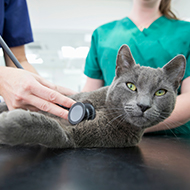
College is now aware of 278 cases of the condition.
More than 270 cats in the UK are now known to have contracted feline pancytopenia, according to the Royal Veterinary College (RVC).
In its latest update, the RVC said that it is aware of 278 cases of the condition, with a mortality rate of 70.2 per cent. The figures are based on cases treated in RVC’s hospitals and information provided by a small number of vets across the UK.
It comes after manufacturer Fold Hill Foods recalled selected ranges from AVA (Pets At Home), Applaws & Sainsbury’s as a precautionary measure, while researchers at the RVC investigate a possible link to the disease.
Pet owners are being advised by the Food Standards Agency to stop feeding the listed products to their cats and to seek veterinary help if they are concerned about their pet's health.
An RVC spokesperson said: “We can confirm that we are aware of a series of cases of fatal pancytopenia in cats in the UK.
“After noticing an increase in cats presenting with pancytopenia in May, we have been gathering data from UK vets from these affected cats. Based on the evidence to date, the one aspect of these cases that formed a consistent pattern was the diet of the affected individuals."
They continued: "From the data shared, most cats show some non-specific signs for around two days before being seen by a vet. Common signs include lethargy and loss of appetite, although in some cases there are signs of spontaneous bleeding or bruising. We encourage owners to contact their veterinary practice if they are worried that their cat may be affected.
“Given this apparent association with diet, we welcome the Food Standards Agency’s (FSA) product recall notice. While we have not definitively established diet as the cause of pancytopenia in these cats, we are continuing to liaise with the pet food industry and regulatory bodies to investigate the matter and identify the possible underlying causes of this extremely serious condition."
To support the efforts of researchers to curtail the disease, vets who have seen cases are being invited to complete RVC's online survey.



 The RCVS has announced a new version of its 1CPD mobile app, with enhanced features for veterinary surgeons and veterinary nurses to record their continuing professional development.
The RCVS has announced a new version of its 1CPD mobile app, with enhanced features for veterinary surgeons and veterinary nurses to record their continuing professional development.